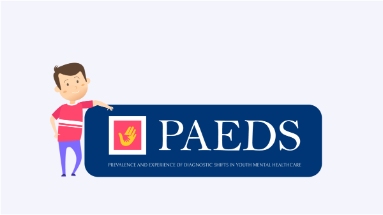Prevalence and Experience of Diagnostic Shifts in Youth Mental Healthcare (PAEDS)

Investigators: Dr Cliódhna O’Connor, Prof Fiona McNicholas
Funder: European Commission
Being diagnosed with a neurodevelopmental or mental health disorder can have profound consequences for how young people see themselves and relate to others. For various reasons, some young people may have their original diagnosis changed as they move through mental health services. The PAEDS study set out to explore how frequently these diagnostic shifts happen and their social, emotional and practical repercussions for young people and their families. Results informed the development of free resources to help clinicians, young people and parents communicate and adapt to diagnostic shifts.
Key References:
O’Connor, C., & McNicholas, F. (2020). Lived experiences of diagnostic shifts in child and adolescent mental health contexts: a qualitative interview study with young people and parents. Journal of Abnormal Child Psychology, 48, 979-993.(opens in a new window)https://doi.org/10.1007/s10802-020-00657-0
O’Connor, C., Downs, J., Shetty, H., & McNicholas, F. (2020). Diagnostic trajectories in child and adolescent mental health services: exploring the prevalence and patterns of diagnostic adjustments in an electronic mental health case register. European Child & Adolescent Psychiatry, 29, 1111-1123.(opens in a new window)https://doi.org/10.1007/s00787-019-01428-z
O’Connor, C., Kadianaki, I., Maunder, K., & McNicholas, F. (2018). How does psychiatric diagnosis affect young people’s self-concept and social identity? A systematic review and synthesis of the qualitative literature. Social Science & Medicine, 212, 94-119.(opens in a new window)https://doi.org/10.1016/j.socscimed.2018.07.011